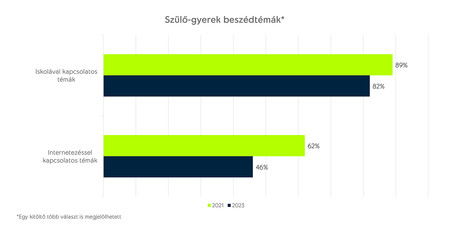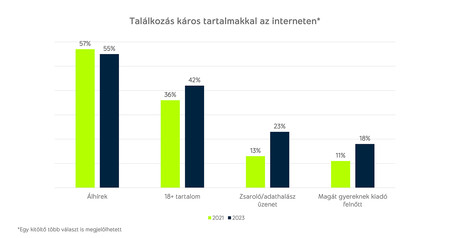Although only up to half of parents talk to their children about what’s happening online, a much higher proportion (85%) believe they know exactly what their children are sharing about themselves on social media, according to this year’s ProSuli TudatosNet survey*. Research for Safer Internet Day looked at changes in young people’s online activity and awareness over the past two years. Facebook and its chat app Messenger remain the most popular platform (66%), with a slight increase in usage for the age groups surveyed. Instagram’s popularity, on the other hand, has fallen overall from 43% to 35% – although this platform is still popular with adolescents. The photo-sharing app’s second place was taken over by TikTok this year, with half of children now using it, up from 39%. YouTube came third, with four out of ten respondents using it on a regular basis. Even 7- to 12-year-olds are already very active online on these platforms, although most platforms do not allow registration under the age of 13.
Respondents said their children typically share photos of themselves, friends or family (32%) and photos of where they live, their hobbies, pets or school (25%) online, but compared to previous surveys, this habit is starting to lose popularity, with the proportion of children who do not share anything online up from 18% to 44% this year.
Children discuss a wide range of topics with their parents when they return home from school, but these are mostly confined to what happened at school (89%), studying (86%), good behaviour (80%) and grievances at school or after school (74%). Chatting online with strangers, using social media sites, cyberbullying and good online conduct are still not among the hottest topics in the parent-child discourse. While in the past, around 62% of conversations were about online topics (probably due to the pandemic), this year’s average is down to 46%.
Children are exposed to harmful content from a very early age and this trend is getting stronger
Feedback from parents suggests that children see content that is not appropriate for them from a very early age: 71% of them have definitely encountered fake news, adult content, ransom or phishing messages, or adults pretending to be children of the same age in the online space. The numbers of encounters with 18+ content, fraudulent strangers and unwanted messages have also increased over the past two years. It’s encouraging, however, that when children encounter such content or phenomena, a very high proportion of them (82%) share it with their parents during conversations.
Parents tend to deal with these encounters by talking to their children (87%), and less often by looking up on the internet what to do (12%), but there are also some who do not deal with these issues at all (5%) or are helpless about how to deal with them (3%). Those who ask for help tend to share their experiences with their partner (55%) or other parents (46%).
“As the use of social media sites and apps keeps growing and more and more people enjoy their benefits, the chances of children being exposed to harmful content at a relatively young age are also increasing. Since the pandemic is over and life is back to normal, there has been a slight shift of attention away from young people’s online activity, even though they still spend a significant amount of time online. This year, on Safer Internet Day, we want to raise awareness that you can be prepared for online threats just as you would be for the dangers of the physical world. And you not only can, but you should. This is where we would like to help parents, teachers and children with our TudatosNet videos”, said Balázs Koren, Head of ProSuli.
An important talking point – here’s how to get help
This year, Yettel’s digital education program, ProSuli, will focus on protecting children online and promoting digital awareness. The TudatosNet video series explores topics such as fake news, cyberbullying, safe browsing and the appropriate use of chat apps, providing potential talking points for discussions between parents and children in the form of engaging animated short films. If you want to learn more or test your knowledge on the subject, you can do so in a playful way on our TudatosNet quiz site.
*The survey was conducted in January 2023 using a sample of 294 responding parents. The sample is representative of the parent population living in Hungary with children in the age group of 7 to 18.


